University Essay: Applying Erikson's Psychosocial Development Theory
VerifiedAdded on 2022/11/02
|6
|1563
|288
Essay
AI Summary
This essay delves into the concept of psychosocial development, focusing on Erikson's theory and its application through a case study. The essay begins by highlighting the significance of psychosocial development in children, examining two examples from the case study to illustrate key principles. It then explores the role of nurses and parents in fostering healthy psychosocial growth, emphasizing the importance of supportive environments and appropriate guidance. The essay also discusses factors that influence psychosocial development, such as parenting styles and environmental influences, and their impact on a child's mental and emotional well-being. The case study, featuring a 2.5-year-old child, is analyzed within the context of Erikson's stages, specifically the autonomy versus shame and doubt stage. The essay concludes by emphasizing the critical role of parents and healthcare professionals in supporting children through these developmental stages, providing them with the tools and encouragement they need to build self-esteem and a sense of independence.
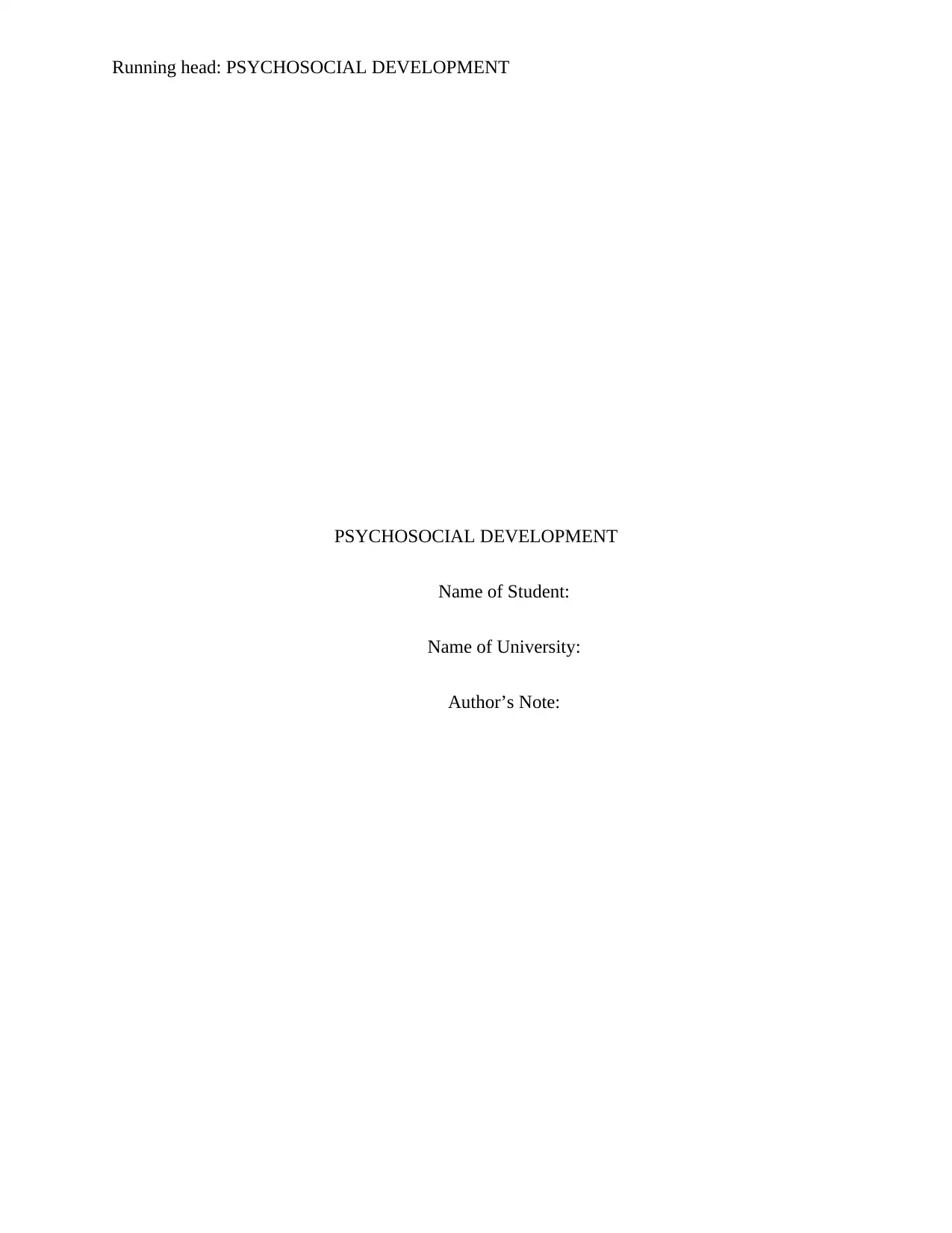
Running head: PSYCHOSOCIAL DEVELOPMENT
PSYCHOSOCIAL DEVELOPMENT
Name of Student:
Name of University:
Author’s Note:
PSYCHOSOCIAL DEVELOPMENT
Name of Student:
Name of University:
Author’s Note:
Paraphrase This Document
Need a fresh take? Get an instant paraphrase of this document with our AI Paraphraser
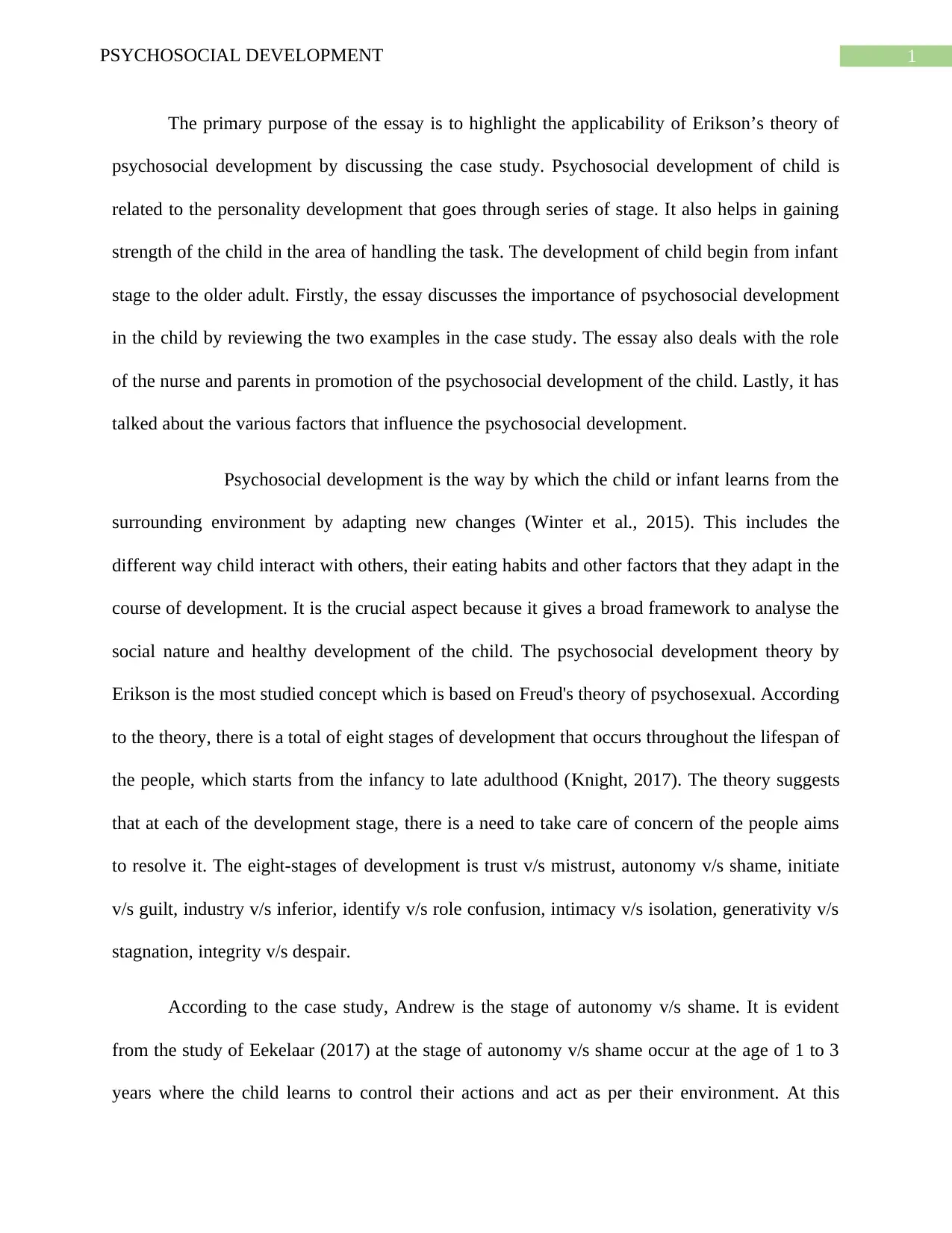
1PSYCHOSOCIAL DEVELOPMENT
The primary purpose of the essay is to highlight the applicability of Erikson’s theory of
psychosocial development by discussing the case study. Psychosocial development of child is
related to the personality development that goes through series of stage. It also helps in gaining
strength of the child in the area of handling the task. The development of child begin from infant
stage to the older adult. Firstly, the essay discusses the importance of psychosocial development
in the child by reviewing the two examples in the case study. The essay also deals with the role
of the nurse and parents in promotion of the psychosocial development of the child. Lastly, it has
talked about the various factors that influence the psychosocial development.
Psychosocial development is the way by which the child or infant learns from the
surrounding environment by adapting new changes (Winter et al., 2015). This includes the
different way child interact with others, their eating habits and other factors that they adapt in the
course of development. It is the crucial aspect because it gives a broad framework to analyse the
social nature and healthy development of the child. The psychosocial development theory by
Erikson is the most studied concept which is based on Freud's theory of psychosexual. According
to the theory, there is a total of eight stages of development that occurs throughout the lifespan of
the people, which starts from the infancy to late adulthood (Knight, 2017). The theory suggests
that at each of the development stage, there is a need to take care of concern of the people aims
to resolve it. The eight-stages of development is trust v/s mistrust, autonomy v/s shame, initiate
v/s guilt, industry v/s inferior, identify v/s role confusion, intimacy v/s isolation, generativity v/s
stagnation, integrity v/s despair.
According to the case study, Andrew is the stage of autonomy v/s shame. It is evident
from the study of Eekelaar (2017) at the stage of autonomy v/s shame occur at the age of 1 to 3
years where the child learns to control their actions and act as per their environment. At this
The primary purpose of the essay is to highlight the applicability of Erikson’s theory of
psychosocial development by discussing the case study. Psychosocial development of child is
related to the personality development that goes through series of stage. It also helps in gaining
strength of the child in the area of handling the task. The development of child begin from infant
stage to the older adult. Firstly, the essay discusses the importance of psychosocial development
in the child by reviewing the two examples in the case study. The essay also deals with the role
of the nurse and parents in promotion of the psychosocial development of the child. Lastly, it has
talked about the various factors that influence the psychosocial development.
Psychosocial development is the way by which the child or infant learns from the
surrounding environment by adapting new changes (Winter et al., 2015). This includes the
different way child interact with others, their eating habits and other factors that they adapt in the
course of development. It is the crucial aspect because it gives a broad framework to analyse the
social nature and healthy development of the child. The psychosocial development theory by
Erikson is the most studied concept which is based on Freud's theory of psychosexual. According
to the theory, there is a total of eight stages of development that occurs throughout the lifespan of
the people, which starts from the infancy to late adulthood (Knight, 2017). The theory suggests
that at each of the development stage, there is a need to take care of concern of the people aims
to resolve it. The eight-stages of development is trust v/s mistrust, autonomy v/s shame, initiate
v/s guilt, industry v/s inferior, identify v/s role confusion, intimacy v/s isolation, generativity v/s
stagnation, integrity v/s despair.
According to the case study, Andrew is the stage of autonomy v/s shame. It is evident
from the study of Eekelaar (2017) at the stage of autonomy v/s shame occur at the age of 1 to 3
years where the child learns to control their actions and act as per their environment. At this
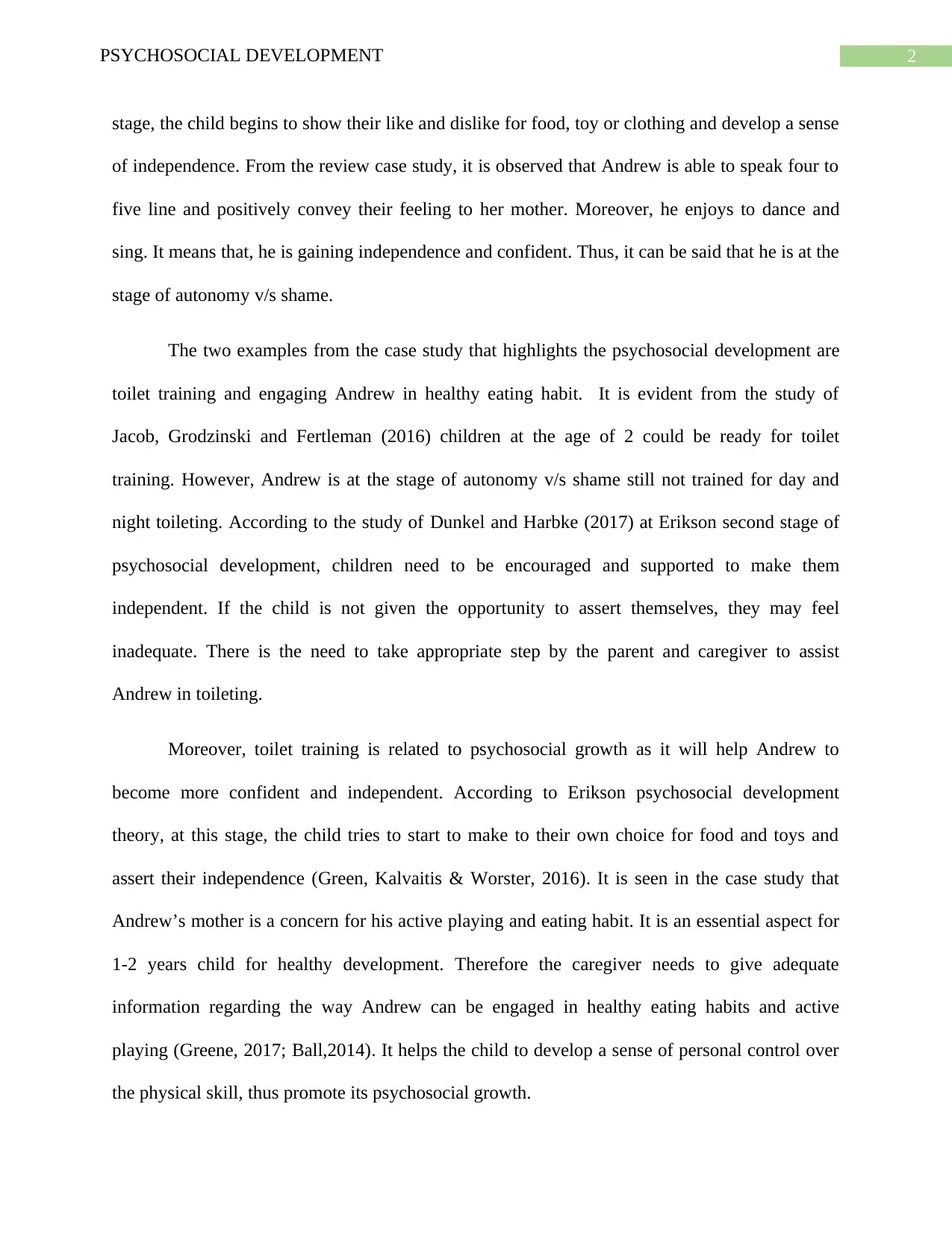
2PSYCHOSOCIAL DEVELOPMENT
stage, the child begins to show their like and dislike for food, toy or clothing and develop a sense
of independence. From the review case study, it is observed that Andrew is able to speak four to
five line and positively convey their feeling to her mother. Moreover, he enjoys to dance and
sing. It means that, he is gaining independence and confident. Thus, it can be said that he is at the
stage of autonomy v/s shame.
The two examples from the case study that highlights the psychosocial development are
toilet training and engaging Andrew in healthy eating habit. It is evident from the study of
Jacob, Grodzinski and Fertleman (2016) children at the age of 2 could be ready for toilet
training. However, Andrew is at the stage of autonomy v/s shame still not trained for day and
night toileting. According to the study of Dunkel and Harbke (2017) at Erikson second stage of
psychosocial development, children need to be encouraged and supported to make them
independent. If the child is not given the opportunity to assert themselves, they may feel
inadequate. There is the need to take appropriate step by the parent and caregiver to assist
Andrew in toileting.
Moreover, toilet training is related to psychosocial growth as it will help Andrew to
become more confident and independent. According to Erikson psychosocial development
theory, at this stage, the child tries to start to make to their own choice for food and toys and
assert their independence (Green, Kalvaitis & Worster, 2016). It is seen in the case study that
Andrew’s mother is a concern for his active playing and eating habit. It is an essential aspect for
1-2 years child for healthy development. Therefore the caregiver needs to give adequate
information regarding the way Andrew can be engaged in healthy eating habits and active
playing (Greene, 2017; Ball,2014). It helps the child to develop a sense of personal control over
the physical skill, thus promote its psychosocial growth.
stage, the child begins to show their like and dislike for food, toy or clothing and develop a sense
of independence. From the review case study, it is observed that Andrew is able to speak four to
five line and positively convey their feeling to her mother. Moreover, he enjoys to dance and
sing. It means that, he is gaining independence and confident. Thus, it can be said that he is at the
stage of autonomy v/s shame.
The two examples from the case study that highlights the psychosocial development are
toilet training and engaging Andrew in healthy eating habit. It is evident from the study of
Jacob, Grodzinski and Fertleman (2016) children at the age of 2 could be ready for toilet
training. However, Andrew is at the stage of autonomy v/s shame still not trained for day and
night toileting. According to the study of Dunkel and Harbke (2017) at Erikson second stage of
psychosocial development, children need to be encouraged and supported to make them
independent. If the child is not given the opportunity to assert themselves, they may feel
inadequate. There is the need to take appropriate step by the parent and caregiver to assist
Andrew in toileting.
Moreover, toilet training is related to psychosocial growth as it will help Andrew to
become more confident and independent. According to Erikson psychosocial development
theory, at this stage, the child tries to start to make to their own choice for food and toys and
assert their independence (Green, Kalvaitis & Worster, 2016). It is seen in the case study that
Andrew’s mother is a concern for his active playing and eating habit. It is an essential aspect for
1-2 years child for healthy development. Therefore the caregiver needs to give adequate
information regarding the way Andrew can be engaged in healthy eating habits and active
playing (Greene, 2017; Ball,2014). It helps the child to develop a sense of personal control over
the physical skill, thus promote its psychosocial growth.
⊘ This is a preview!⊘
Do you want full access?
Subscribe today to unlock all pages.

Trusted by 1+ million students worldwide
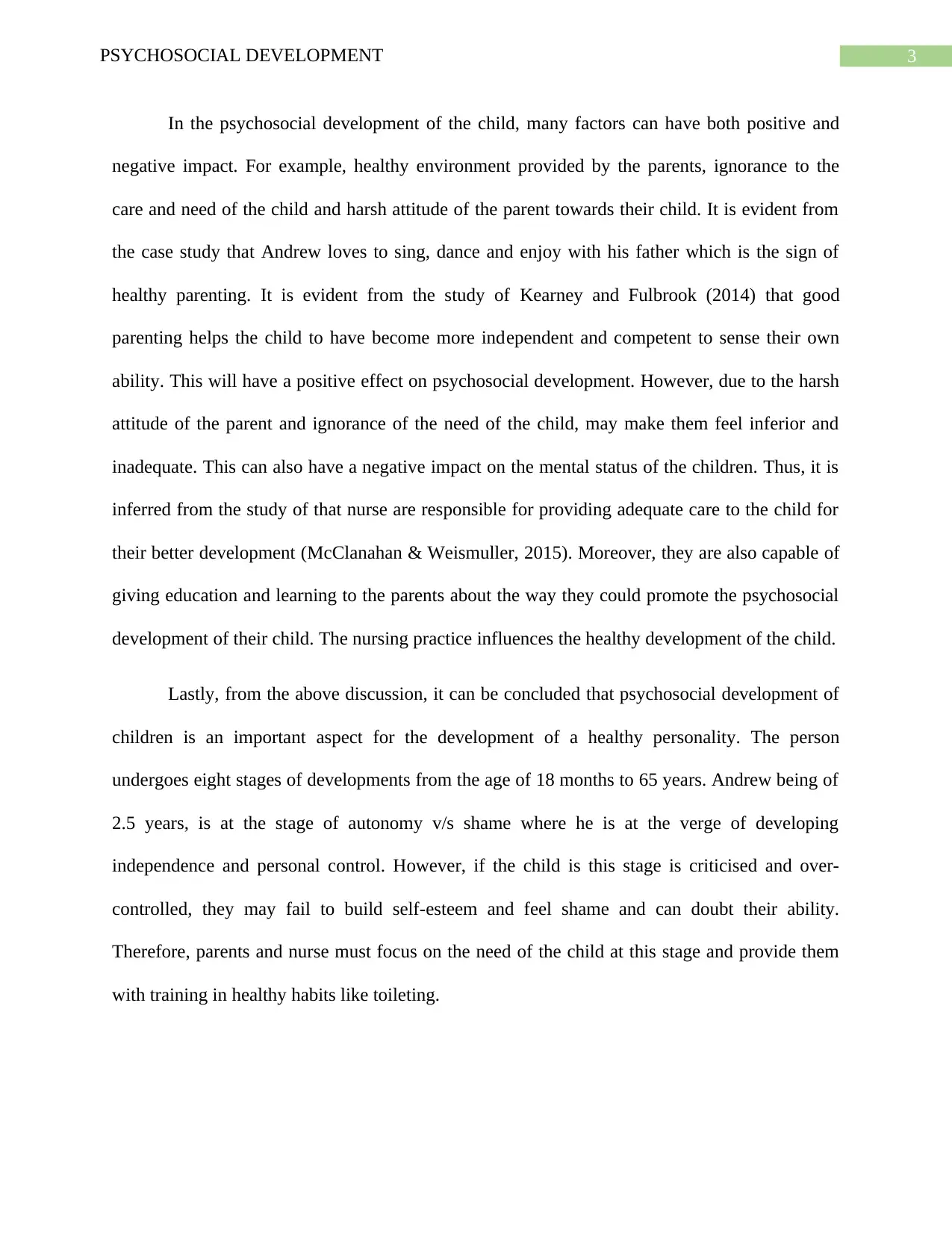
3PSYCHOSOCIAL DEVELOPMENT
In the psychosocial development of the child, many factors can have both positive and
negative impact. For example, healthy environment provided by the parents, ignorance to the
care and need of the child and harsh attitude of the parent towards their child. It is evident from
the case study that Andrew loves to sing, dance and enjoy with his father which is the sign of
healthy parenting. It is evident from the study of Kearney and Fulbrook (2014) that good
parenting helps the child to have become more independent and competent to sense their own
ability. This will have a positive effect on psychosocial development. However, due to the harsh
attitude of the parent and ignorance of the need of the child, may make them feel inferior and
inadequate. This can also have a negative impact on the mental status of the children. Thus, it is
inferred from the study of that nurse are responsible for providing adequate care to the child for
their better development (McClanahan & Weismuller, 2015). Moreover, they are also capable of
giving education and learning to the parents about the way they could promote the psychosocial
development of their child. The nursing practice influences the healthy development of the child.
Lastly, from the above discussion, it can be concluded that psychosocial development of
children is an important aspect for the development of a healthy personality. The person
undergoes eight stages of developments from the age of 18 months to 65 years. Andrew being of
2.5 years, is at the stage of autonomy v/s shame where he is at the verge of developing
independence and personal control. However, if the child is this stage is criticised and over-
controlled, they may fail to build self-esteem and feel shame and can doubt their ability.
Therefore, parents and nurse must focus on the need of the child at this stage and provide them
with training in healthy habits like toileting.
In the psychosocial development of the child, many factors can have both positive and
negative impact. For example, healthy environment provided by the parents, ignorance to the
care and need of the child and harsh attitude of the parent towards their child. It is evident from
the case study that Andrew loves to sing, dance and enjoy with his father which is the sign of
healthy parenting. It is evident from the study of Kearney and Fulbrook (2014) that good
parenting helps the child to have become more independent and competent to sense their own
ability. This will have a positive effect on psychosocial development. However, due to the harsh
attitude of the parent and ignorance of the need of the child, may make them feel inferior and
inadequate. This can also have a negative impact on the mental status of the children. Thus, it is
inferred from the study of that nurse are responsible for providing adequate care to the child for
their better development (McClanahan & Weismuller, 2015). Moreover, they are also capable of
giving education and learning to the parents about the way they could promote the psychosocial
development of their child. The nursing practice influences the healthy development of the child.
Lastly, from the above discussion, it can be concluded that psychosocial development of
children is an important aspect for the development of a healthy personality. The person
undergoes eight stages of developments from the age of 18 months to 65 years. Andrew being of
2.5 years, is at the stage of autonomy v/s shame where he is at the verge of developing
independence and personal control. However, if the child is this stage is criticised and over-
controlled, they may fail to build self-esteem and feel shame and can doubt their ability.
Therefore, parents and nurse must focus on the need of the child at this stage and provide them
with training in healthy habits like toileting.
Paraphrase This Document
Need a fresh take? Get an instant paraphrase of this document with our AI Paraphraser
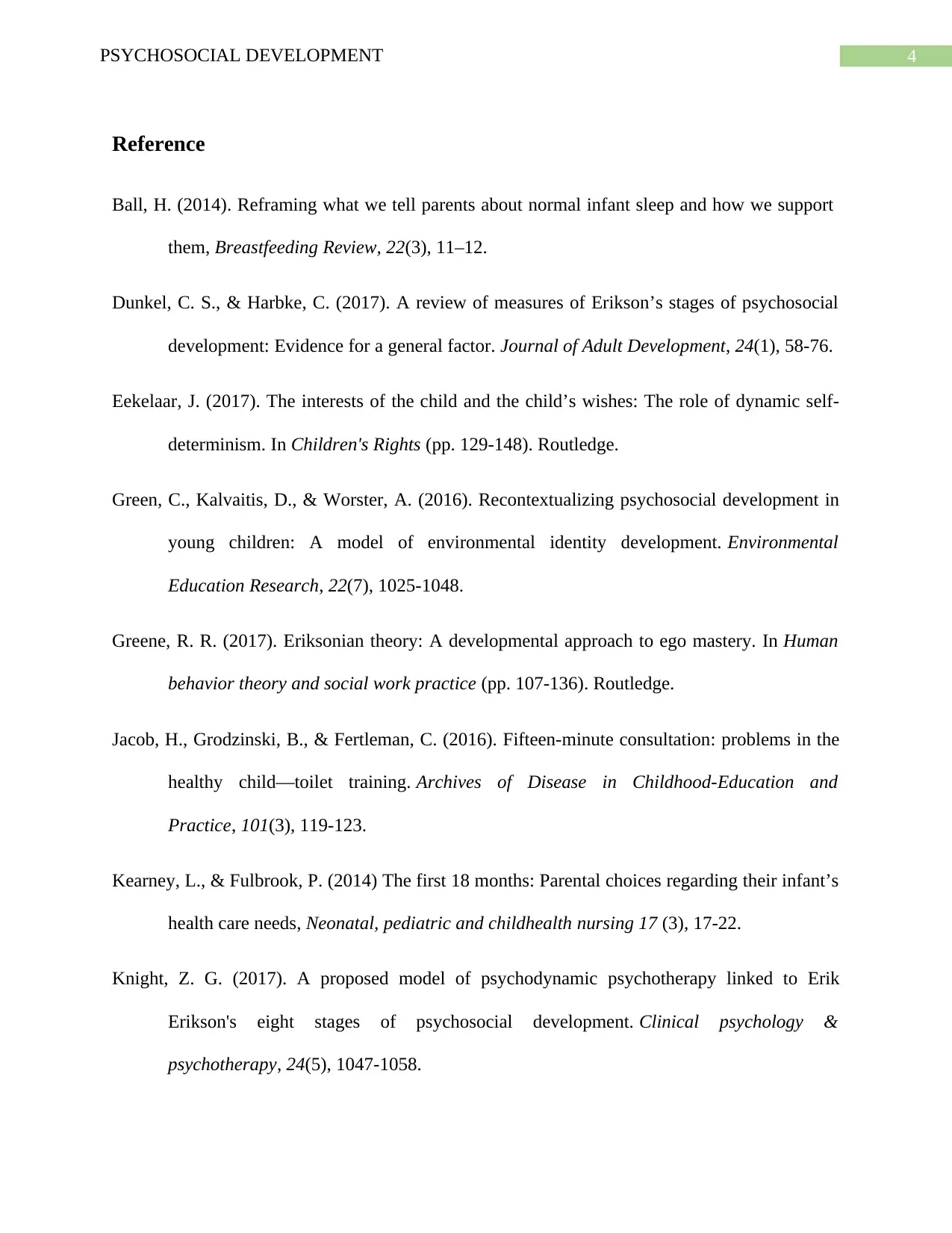
4PSYCHOSOCIAL DEVELOPMENT
Reference
Ball, H. (2014). Reframing what we tell parents about normal infant sleep and how we support
them, Breastfeeding Review, 22(3), 11–12.
Dunkel, C. S., & Harbke, C. (2017). A review of measures of Erikson’s stages of psychosocial
development: Evidence for a general factor. Journal of Adult Development, 24(1), 58-76.
Eekelaar, J. (2017). The interests of the child and the child’s wishes: The role of dynamic self-
determinism. In Children's Rights (pp. 129-148). Routledge.
Green, C., Kalvaitis, D., & Worster, A. (2016). Recontextualizing psychosocial development in
young children: A model of environmental identity development. Environmental
Education Research, 22(7), 1025-1048.
Greene, R. R. (2017). Eriksonian theory: A developmental approach to ego mastery. In Human
behavior theory and social work practice (pp. 107-136). Routledge.
Jacob, H., Grodzinski, B., & Fertleman, C. (2016). Fifteen-minute consultation: problems in the
healthy child—toilet training. Archives of Disease in Childhood-Education and
Practice, 101(3), 119-123.
Kearney, L., & Fulbrook, P. (2014) The first 18 months: Parental choices regarding their infant’s
health care needs, Neonatal, pediatric and childhealth nursing 17 (3), 17-22.
Knight, Z. G. (2017). A proposed model of psychodynamic psychotherapy linked to Erik
Erikson's eight stages of psychosocial development. Clinical psychology &
psychotherapy, 24(5), 1047-1058.
Reference
Ball, H. (2014). Reframing what we tell parents about normal infant sleep and how we support
them, Breastfeeding Review, 22(3), 11–12.
Dunkel, C. S., & Harbke, C. (2017). A review of measures of Erikson’s stages of psychosocial
development: Evidence for a general factor. Journal of Adult Development, 24(1), 58-76.
Eekelaar, J. (2017). The interests of the child and the child’s wishes: The role of dynamic self-
determinism. In Children's Rights (pp. 129-148). Routledge.
Green, C., Kalvaitis, D., & Worster, A. (2016). Recontextualizing psychosocial development in
young children: A model of environmental identity development. Environmental
Education Research, 22(7), 1025-1048.
Greene, R. R. (2017). Eriksonian theory: A developmental approach to ego mastery. In Human
behavior theory and social work practice (pp. 107-136). Routledge.
Jacob, H., Grodzinski, B., & Fertleman, C. (2016). Fifteen-minute consultation: problems in the
healthy child—toilet training. Archives of Disease in Childhood-Education and
Practice, 101(3), 119-123.
Kearney, L., & Fulbrook, P. (2014) The first 18 months: Parental choices regarding their infant’s
health care needs, Neonatal, pediatric and childhealth nursing 17 (3), 17-22.
Knight, Z. G. (2017). A proposed model of psychodynamic psychotherapy linked to Erik
Erikson's eight stages of psychosocial development. Clinical psychology &
psychotherapy, 24(5), 1047-1058.
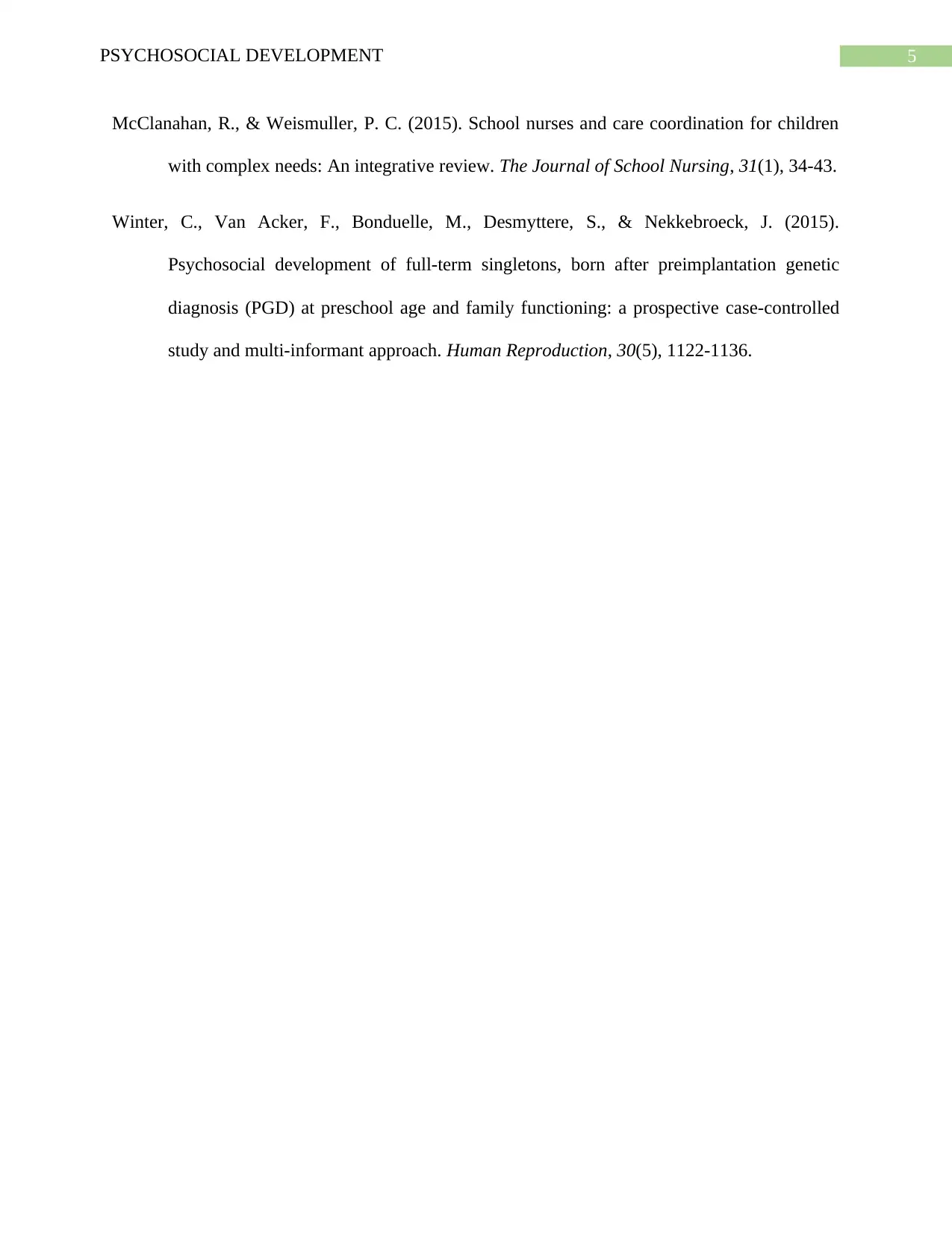
5PSYCHOSOCIAL DEVELOPMENT
McClanahan, R., & Weismuller, P. C. (2015). School nurses and care coordination for children
with complex needs: An integrative review. The Journal of School Nursing, 31(1), 34-43.
Winter, C., Van Acker, F., Bonduelle, M., Desmyttere, S., & Nekkebroeck, J. (2015).
Psychosocial development of full-term singletons, born after preimplantation genetic
diagnosis (PGD) at preschool age and family functioning: a prospective case-controlled
study and multi-informant approach. Human Reproduction, 30(5), 1122-1136.
McClanahan, R., & Weismuller, P. C. (2015). School nurses and care coordination for children
with complex needs: An integrative review. The Journal of School Nursing, 31(1), 34-43.
Winter, C., Van Acker, F., Bonduelle, M., Desmyttere, S., & Nekkebroeck, J. (2015).
Psychosocial development of full-term singletons, born after preimplantation genetic
diagnosis (PGD) at preschool age and family functioning: a prospective case-controlled
study and multi-informant approach. Human Reproduction, 30(5), 1122-1136.
⊘ This is a preview!⊘
Do you want full access?
Subscribe today to unlock all pages.

Trusted by 1+ million students worldwide
1 out of 6
Related Documents
Your All-in-One AI-Powered Toolkit for Academic Success.
+13062052269
info@desklib.com
Available 24*7 on WhatsApp / Email
![[object Object]](/_next/static/media/star-bottom.7253800d.svg)
Unlock your academic potential
Copyright © 2020–2026 A2Z Services. All Rights Reserved. Developed and managed by ZUCOL.





